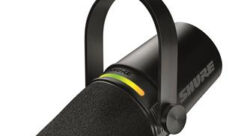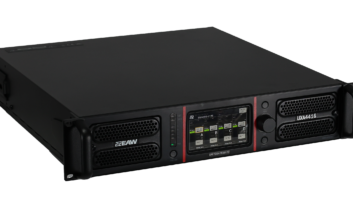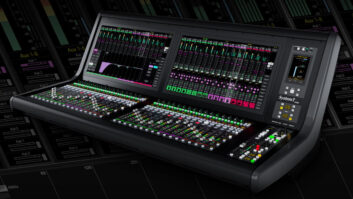Focus on the Background
Oct 1, 2001 12:00 PM,
By Rosanne Soifer
WE HEAR IT ALL THE TIME — SOMETIMES CONSCIOUSLY, most often not. The music trickling out of the speakers at stores, cafes, airports and doctors’ offices fills in the soundtrack of our lives in a comforting way. Commercial background music has evolved from stereotypical “elevator” music into customized music packages. Today, it’s often the original recordings — not those bland orchestral versions of pop songs — and even original music by unsigned artists that you hear. Commercial background music, video and other media are attractive to large businesses in the fashion, in-flight, specialty retail and hospitality industries because:
- The venue doesn’t have to hire an outsider to install and maintain a system, nor train staff to operate it.
- With uninterrupted music by the original artists now available, the venue doesn’t have to buy and arrange CDs.
- Song information is provided onscreen, if desired.
- All music-licensing fees are paid directly by the content provider.
Companies such as PlayNetwork are also starting to target the small-business market via online subscription services. According to Adam Brotman, president and CEO of PlayNetwork, small businesses were neglected by the industry until just recently because of the high cost of acquiring customers, delivering the service to them, and educating them on copyright laws. Also, small businesses such as individual retailers, clubs and restaurants, as well as the independent audio/video contractors who serviced them, tended to think the commercial music industry irrelevant to their operations. Now that music systems have come down in price and become easier to use, small businesses are getting involved and learning the legal restrictions and definitions that apply.
Unlike consumer-driven Internet companies such as Napster and MP3, the industry has a proven history of generating revenue rather than lawsuits for its creators. Copyright and licensing issues for background music systems don’t really affect independent sound and video contractors. Contractors can’t be fined or held liable when a client eschews paying royalties. However, independent contractors should certainly learn the rules and laws, says Stacy Hendricks, strategic communications specialist for PlayNetwork. “It can’t hurt and might be seen as a value-added to businesses that aren’t educated about their liabilities.”
MUSIC RIGHTS
This includes understanding the roles of the much dreaded “permissions police” used by ASCAP, BMI and Sesac. It won’t matter whether the venue uses a commercial background system, an independently installed one, or speakers and mics for live performances. The ASCAP, BMI and Sesac permissions police may not check every mom-and-pop retailer, but they do perform spot checks and keep an eye out for violations. A business with thousands of international locations is obviously exposed, but so is a small retail chain, especially when located in high-visibility areas such as malls.
ASCAP, BMI and Sesac grant businesses the permissions they need to perform music publicly. All three maintain that music benefits business because, like other amenities, it provides what all businesses traditionally desire: heightened customer satisfaction, increased profits and improved employee morale.
Contractors should realize that each piece of recorded music has two copyrights: one for the composition itself, which is generally owned by the songwriter, and one that covers the sound recording, which is generally owned by the record label and the publishing company. This second copyright, known as publishing rights or mechanical rights, is represented and tallied by the Harry Fox organization, a division of the National Music Publishers’ Association. Whether music is presented live or from a recording, whether there is an admission charge, the size of the venue, and a host of other criteria, determine how much each venue must pay for performance rights. (There are some cases in which royalties may not have to be paid by certain businesses or residential venues.)
WORKING WITH A PROVIDER
Generally, an independent sound and video contractor must formally affiliate with a commercial music company in order to do business with them.
PlayNetwork
PlayNetwork Inc. was established in 1994 and is based in Redmond, Washington. It supplies in-store music, video and sound systems for retail stores and restaurants. Clients include Starbucks Coffee, Finish Line, Amtrak and Voice-Stream Wireless. In addition to offering a range of proprietary software and playback devices, PlayNetwork has entered partnership agreements with such companies as Tannoy, BTV, NRL, vTSC and Cambridge Soundworks. In July 2001, Spacenet Inc. and PlayNetwork agreed to bundle PlayNetwork’s custom music programming with Spacenet’s satellite-based networking services, targeting the combined offering to Fortune 500 retail and restaurant enterprises.
Says Stephen Dorsey, marketing vice president, “PlayNetwork isn’t a franchise. We are establishing a network of affiliates who will be permitted to sell and service our equipment. Or a venue can contact us directly. Should an independent audio/video professional wish to work with PlayNetwork, he or she must become affiliated through our quality-assurance program, called GIGS — Great Installation-Great Sound.”
A contractor who enrolls in GIGS is expected to use PlayNetwork’s reporting procedures and photo documentation standards. Dorsey continues, “Becoming a PlayNetwork affiliate is not like being an insurance broker who reps several companies. Our affiliate is exclusive to PlayNetwork, although obviously he or she can continue to do other types of sound design and installation.”
A venue’s monthly fee to PlayNetwork covers music licensing fees. The GIGS affiliate gets paid by PlayNetwork when the job is completed and deemed acceptable. PlayNetwork also recognizes several affiliate networks such as AVM Solutions and BTV, companies that resell equipment like security and sound systems.
DMX/AEI
In May 2001, DMX Music of Los Angeles merged with AEI Music Network to form DMX/AEI Music, bringing more than 30 years of combined experience to the industry. The company supplies more than 250 genres of nonstop music, delivered via digital cable to businesses and homes. DMX/AEI clients include Victoria’s Secret, Pottery Barn, Saks Fifth Avenue and Olive Garden.
Says Rich Tucci, vice president affiliate sales, commercial, “Only authorized DMX/AEI Music affiliates, sales agents or immediate employees can sell our product line. Any independent can request in writing to become an authorized affiliate or sales agent for a specific geographic territory, specific vertical market or specific customer group. If there are distribution opportunities, a meeting is arranged.” (Note: the prospective affiliate should be prepared to present a business plan that includes both a company profile and a marketing and publicity plan.)
Regarding formal affiliation, Tucci continues, “Installation and service work may be referred from national account sales, local sales and other affiliates who are part of the network.” Similar to PlayNetwork, DMX/AEI seeks exclusive affiliate relationships but recognizes that many of its affiliates may rep other services and do other kinds of work. If the affiliate outsources part of the job, he is responsible for equipment, insurance, permits, etc.
Russ Dubrow, president of electronic technology, worked with DMX/AEI as an agent selling the DMX product. He states, “Generally, I create and fill out my own paperwork for a job. DMX looks for experienced people who can get the job done. And I do try to educate the venue on music licensing.” Susan Schneider, sales manager for the DMX/AEI office in Lake Forest, California, elaborates, “If an independent wants to become an affiliate, he or she must contact our affiliate department. We actually have very few independent sales agents; they do their own sales and installations and promote DMX Music. If they’re successful, we pay them either a flat fee or a percentage.”
Adds Tucci, “The music licensing monies in the monthly usage fees are paid to the affiliate, then get extracted by us and remitted to ASCAP, BMI and Sesac. The venue must be told that any additional music or entertainment they put in that we don’t cover becomes their financial responsibility.”
Music Choice
Music Choice of Horsham, Pennsylvania, is another content provider with yet another setup. It was established in the late 1980s as DCR, then re-branded in 1994 as Music Choice. It is delivered to the customers’ televisions via satellite providers or through digital cable. An independent can become an authorized Music Choice dealer by applying online.
Muzak
Muzak has franchisees, not affiliates. Steve Seiden is the president of Independence Communications Inc. Muzak in Philadelphia, the largest Muzak affiliate in the United States. He says there are no franchises up for sale right now. And, he adds, you can’t look to form a new one. You become a franchisee by purchasing an existing one for about $5 million. An independent, however, can sell Muzak products and services but can’t represent any competitors. Clients pay monthly service fees, which cover ASCAP, BMI and Sesac; with Muzak acting as the pay conduit and go-between. An independent may sometimes informally affiliate with ICI Muzak by recommending the company to a client. “Then,” says Seiden, “that person would receive some sort of finder’s fee.” Adds Kenny Kahn, vice president of marketing for Muzak LLC, “Muzak occasionally subs out installations.”
YOUR CHECKLIST
Understanding the realities, protocol and requirements of the commercial background music industry may bring the independent company new revenues and new business. Here is a checklist and some guidelines to keep in mind as you explore this opportunity:
- Clarify the terms! Words like end-user, client, affiliate and agent carry different legal meanings in different companies.
- If you outsource any work from a background content provider, you are ultimately responsible for the product.
- If the client (and not you) is responsible for paying ASCAP, BMI and Sesac licensing fees, make sure that it is understood, and put it in the contract.
- Don’t recommend a particular music system to a client without authorization first. You will collect neither brownie points nor a finder’s fee by doing so.
- If your client is a venue with a proprietary system whose monthly fees include ASCAP, BMI and Sesac payments — and you are asked to add a CD player or a TV system, for example — you should inform the client that the monthly fees do not cover these add-ons.
- If the company recognizes a network of affiliates, joining it can maximize your business and increase work referrals.
- Understand each company’s system of remuneration for independents, agents or affiliates. DMX/AEI has affiliates bill customers directly for the monthly service, and then pay DMX/AEI. Authorized sales agents get an installation fee and a sales commission once the account is successfully installed. PlayNetwork pays the affiliate for services upon receipt of customer-approval documentation. Make sure you know the details of your compensation.
- Satellite partnerships are now becoming a part of life for any business that needs to deliver data, video or audio to many dispersed locations. This, too, has its own language and terminology. A partial glossary is available online from Spacenet.
Rosanne Soifer is a musician and writer based in New York. She may be reached at[email protected].
Online Resources for More Information
DMX/AEI Music
www.dmxmusic.com;
www.aeimusic.com
PlayNetwork
www.playnetwork.com
Muzak
www.muzak.com
ICI Muzak
www.icimuzak.com
Music Choice
www.musicchoice.com
Spacenet Inc.
www.spacenet.com
Harry Fox Agency
www.nmpa.org/hfa.html










